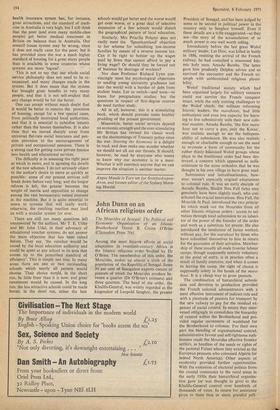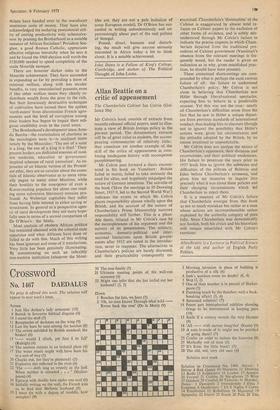John Dunn on an African religious order
The Mourides of Senegal: The Political and Economic Organisation of an Islamic Brotherhood Donal B. Cruise O'Brien (Clarendon Press 70s)
Among the most bizarre efforts at social adaptation in twentieth-century Africa is the Islamic religious order studied by Dr O'Brien. The membership of this order, the Mourides, makes Up almost a sixth of the population of the Republic of Senegal. Some 90 per cent of Senegalese exports consist of peanuts of which the Mourides produce be- tween a quarter (Dr O'Brien's estimate) and three quarters. The head of the order, the Khalifa-General, was widely regarded as the kingmaker of Leopold Senghor, the present
President of Senegal, and has been judged by some to be second in political power in the country only to Senghor himself. Even if these details are a trifle exaggerated—as they are—the story of the accumulation of so much power is one well worth telling.
Immediately before the last great Wolof military leader, Lat Dior, was killed in battle in 1886, resisting the arrival of the French railway, he had consulted a renowned Isla- mic holy man, Amadu Bamba. The latter gave him prudently Delphic advice and so survived the encounter and the French tri- umph with unblemished religious plausi- bility.
Wolof traditional society which had been organised largely for military ventures could not survive the French conquest intact, while the only existing challengers to the Wolof chiefs, the militant reforming Islamic leaders, the marabouts, had little enthusiasm and even less capacity for learn- ing to live submissively with their new colo- nial masters. Amadu Bamba, 'the first mara- bout not to carry a gim, only the Koran', was realistic enough to see the indispens- ability of submission. He was also realistic enough or charitable enough to see the need to re-create a form of community for the rather thinly Islamised Wolof groups whose place in the traditional order had been des- troyed, a concern which appeared so indis- criminate to the more orthodox that he was thought in his own village to have gone mad.
Submission and latitudinarianism, how- ever, weren't especially original adaptations to colonial rule. It was an early disciple of Amadu Bamba, Shaikh [bra Fall (who may genuinely have been slightly mad), who con- tributed the crucial innovations. Ibra Fall, the Mouride St Paul, introduced the two princip- les which mark out the Mourides from all other Islamic religious orders : access to sal- vation through total submission to an inheri- tor of the power of the founder of the order and work as a substitute for prayer. He also introduced the institution of farms worked, without pay, for the marabout by those who have submitted themselves to him in return for the guarantee of their salvation. Member- ship of these usually all-male frontier labour camps, though supposedly entirely voluntary
at the point of entry, is in practice often a result of family coercion, and when it comes to leaving the camp, the right of choice • is supposedly solely in the hands of the mara- bout. It is a cheap way to grow peanuts.
The combination of hierarchical submis- sion and devotion to production provided the French colonial administrators with a most effective instrument of indirect rule and with a plenitude of peanuts for transport by the new railway to pay for the residual ex- penses of social control. In return they inter- vened obligingly to consolidate the hierarchy of control within the Brotherhood and pro- vided regular increments of wasteland for the Brotherhood to colonise. For their own part the blending of organisational control, administrative favour and self-righteous ruth- lessness made the Mourides effective frontier settlers, as heedless of the needs or rights of the pastoral Fulani whom they evicted as the European peasants who colonised Algeria (or indeed North America). Other aspects of modernity provided further opportunities. With the extension of electoral politics from the coastal communes to the rural areas in the early 1950s their hierarchical organisa- tion gave (or was thought to give) to the Khalifa-General control over hundreds of thousands of votes. In return for assistance given to them then or since, grateful poli- tfcians have handed over to the marabouts enormous sums of money. They have also acknowledged the enduring postcolonial util- ity of uniting productivity with submissive- ness by praising the Brotherhood as a notable instance of African Socialism! President Sen- ghor, a good Roman Catholic, appreciates effective religious hieratchy when he sees it
and he found the 1960 election well worth the £120,000 needed to speed completion of the main Mouride mosque.
There are however darker sides to the Mouride achievement. They have succeeded in expanding so far by providing a form of minimal welfare, along with less secular benefits, to very unsecularised peasants, even if like other welfare states they clearly re- distribute wealth from the poor to the rich. But their ferociously destructive techniques of cultivation have earned them the epithet 'earth-eaters' from disconsolate French agro- nomists and the level of corruption among their leaders has begun to impair their reli- gious credibility even in the rural areas.
The Brotherhood's development since Ama- du Bamba—the routinisation of charisma as the sociologists term it—is analysed more tersely by the Mourides: 'The son of a saint is a king; the son of a king is a thief.' Their present leaders are dedicated enemies of mod- ern medicine, education or government- inspired schemes of rural animation'. As ex- ponents of an Islamic version of the Protest- ant ethic, they are so cavalier about the essen- tials of Islamic observance as to seem virtu- ally pagan to many other Muslims, while their hostility to the emergence of even a Koran-reading populace (let alone one read- ing more subversive literature) remains pro- found. As Weberian capitalists they suffer from having little interest in either saving or investment. In general as a prospective agen- cy of rural development they are more hope- fully seen in terms of a second comparison of Dr O'Brien's : the Mafia.
Most analysis of modern African politics has remained obsessed with the colonial state apparatus and what Africans have done or failed to do with this. Much of this writing has been ignorant and some of it mendaciousi Very little has been genuinely illuminating. By concentrating on such an inflexibly non-western institution (whatever the Mour-
ides are, they are not a pale imitation of some European model), Dr O'Brien has suc- ceeded in writing untendentiously and un- patronisingly about part of the real politics of Senegal.
Poised, direct, humane and disturb- ing, the result will give anyone seriously interested in Africa today a lot to think about. It is a notable achievement.
John Dunn is a Fellow of King's College, Cambridge, and author of The Political Thought of John Locke.



































 Previous page
Previous page